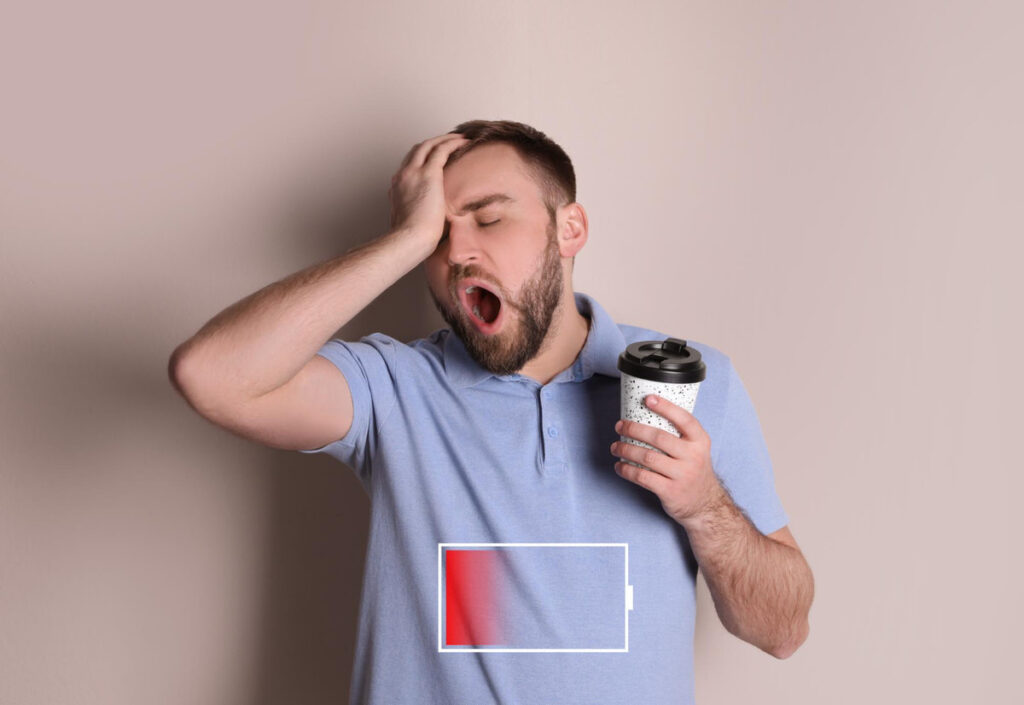Caffeine intake and how it affects you differs from individual to individual. According to the recommended dosage, anywhere from 300-400 mg of caffeine per day shouldn’t cause you any harm. Keep a check on how your daily caffeine intake makes you feel. If you see signs of too much caffeine in your system, you can always follow tips to calm down and let the caffeine wear off. If you’re addicted to too much caffeine, there’re ways you can limit your intake. Remember, caffeine is also present in other foods and beverages, so consume responsibly.
After waking up from a good night’s sleep, you move towards your kitchen and make a cup of hot coffee/iced coffee with your breakfast. While it’s a ritual, it also helps you kickstart your day.
Not only does caffeine help you boost your mood, but it also enhances your mental and physical performance.
While caffeine is found in multiple beverages, it can be good for your health and help you focus on tasks.
But it’s only good as long as consumed moderately. Your health could have adverse effects if you continue drinking large amounts of caffeine.
Let’s look at your capacity for caffeine, how much is too much, and how you can reduce your daily intake if you’re addicted to it!
How much caffeine is too much?
A significant factor of caffeine intake and how it affects you depends on your tolerance. Every person has a different tolerance.
While someone might feel okay taking 4-5 cups of coffee a day, others might be okay with 2 cups of coffee a day, and some might feel occasional caffeine to be fine.
Some people might experience headaches, dizziness, or jitteriness when they drink an occasional cup of coffee.
FDA recommends multiple factors are at play when it comes to caffeine intake and its subsequent effects. These include body weight, medications, and individual capacity, to name a few.
Average amount of caffeine for healthy adults
According to the Food and Drug Administration (FDA), about 400 mg of caffeine is recommended for a healthy adult. This means 4-5 cups of coffee is okay for you to consume if you are a healthy adult.

But if your body metabolizes caffeine slower, you might be sensitive to a higher dosage.
Some of the benefits of caffeine include:
- It may boost weight loss by suppressing your appetite temporarily. It also stimulates thermogenesis, so the body generates more heat and energy from digesting food.
- It increases attention and makes you more alert. It may also improve your reasoning ability, mental, and memory.
- It may improve your physical performance and increase your endurance
- It may help enhance some thinking skills.
- It may help reduce the risk of Alzheimer’s and Parkinson’s disease.
- A study found that increasing daily caffeine intake by more than one cup reduces
How much caffeine is okay for pregnant women?
Women who are expecting children, planning to become pregnant, or are breastfeeding are supposed to limit their caffeine intake to 200 mg of caffeine per day.

Again, you could be okay with 300 mg if your body tolerance is high, but consulting your doctor is essential.
When you’re pregnant, your body’s rate of metabolizing caffeine is reduced. Although the clinical research and long-term effects of a high caffeine intake aren’t clear yet, it’s best to reduce your daily intake.
Risks associated with high caffeine intake
Consuming caffeine is supposed to be done in moderation. Several beverages with caffeine are sold in the market, including soft drinks like Coca-Cola, energy drinks like red bull, and even tea containing some caffeine.
Where some of them might have a higher caffeine content than you realize, and coupled with your regular dosage of coffee, can increase your daily intake.
Therefore, when drinking coffee, you need to look at the other caffeinated beverages consumed apart from your daily coffee.
A lot of times, caffeine can have some health risks if you don’t control your daily intake, and it might result in symptoms such as:
- Insomnia
- Jitters
- Anxiousness
- Fast heart rate
- Upset stomach
- Nausea
- Headache
- A feeling of unhappiness
You might get a seizure if you consume around 1,200 mg or even 0.15 tablespoons of pure caffeine.
So, whenever consuming any supplements, look out for caffeine in the ingredients as they might consist of highly concentrated caffeine in powder or liquid form.
Highly concentrated dosages of caffeine, be they small, could lead to dangerous side effects on your health.
1. Anxiety

Caffeine can induce anxiety disorder. It’s considered one of the four caffeine-related symptoms mentioned in the Diagnostic and Statistical Manual of Mental Disorders (DSM), published by the American Psychiatric Association.
Drinking coffee affects adenosine, a brain chemical that makes you tired. It blocks it and helps you stay alert for some time.
But over time, people might become used to their dosage and increase caffeine intake, which could lead to higher caffeine intake.
A daily intake of 1000 mg of caffeine could cause jitteriness, nervousness, and similar symptoms in most people.
2. Losing sleep
At the end of the day, what caffeine does is help you stay awake.
If necessary, you take it when you need to focus on one task, and caffeine enables you to stay alert and awake to focus on the task.
But it’s advisable to stop drinking beverages that contain caffeine about 5-6 hours before bedtime.
At the same time, some people might metabolize caffeine faster and won’t face a problem drinking caffeine even an hour or two before bedtime.
But others with slow metabolism might need to watch their caffeine intake before bedtime.
If you fail to do so, your restorative sleep will get disturbed. This will make you groggy in the morning, leave you feeling tired, and might even with a slight headache.
Low or moderate dosage doesn’t seem to affect a person that much. But it all depends on the individual and their genetics. For some, the caffeine wears off in a couple of hours or might take 9 hours.
Sometimes, taking melatonin before sleeping might not even help if you’ve had too much caffeine.
3. Stomach issues
Caffeine could also work as a laxative. Some people find drinking caffeine difficult because it gets their bowels moving faster, so they immediately have to use the washroom.
It releases gastrin in the stomach, which is a hormone that speeds up activity in the colon. Drinking large amounts might even turn it into a situation of diarrhea.
Some studies suggest that caffeine could be responsible for GERD or worsen the already present symptoms.
If you face some digestive issues, reducing your caffeine intake is best.
4. Coffee addiction
Believe it or not, it isn’t easy to let go of that habit once you start drinking coffee daily. Be it as little as drinking one cup in the morning, and you’ll find it impossible to leave it.

Although caffeine is considered a drug, its addiction isn’t similar to that of being addicted to the classic drug cases you hear about.
But it still makes you depend on it, and physically and psychologically, you’ll face withdrawal symptoms (not as severe as that of drug addiction) once you try to leave it.
The more caffeine intake you have, the more challenging it’ll be to leave it behind and the stronger the withdrawal symptoms.
5. High blood pressure
Caffeine doesn’t equate to facing heart issues, but it does alleviate blood pressure in some people. This might lead to a risk of heart attack, stroke, and other heart-related problems.
If your caffeine intake increases and you have too much caffeine, you might need to reconsider taking it slow with its intake.
On the other hand, it also increases your heartbeat. If you have an increased heart rate after drinking coffee, you might want to slow down on its consumption or not take it at all. Not everyone is suited for the caffeine lifestyle.
6. Fatigue after effects
You might have an important meeting and want to stay alert for which you consume large amounts of caffeine.
While focusing on the meeting is no issue, and you get through it, but after it ends, you might suddenly feel all energy leaving your body, to the point where you wish to sleep and just lay down and rest.
This after-effect of caffeine is common in many people as they face fatigue when caffeine seems to leave their bodies.
This happens when you suddenly consume a lot of coffee. While you might do this to stay alert longer, it does no such thing. What it does is leave you sleepy and tired.
To avoid such effects, you shouldn’t jump to coffee and create a chain out of this habit but consider consuming caffeine in moderate quantities at suitable intervals.
Our bodies can handle critical tasks and keep us alert without needing caffeine to help us.
7. Increased urination
There’s a chance of increased urination risk as a common side effect of high caffeine intake. Does it happen to you that you use the washroom more when you drink caffeine?
If you see a more than-usual urination pattern, you should cut back and discuss your symptoms with your doctor.
Other risks associated with caffeine
- People who suffer from depression need to watch out for their caffeine intake because it might worsen their symptoms.
- People with type 2 diabetes must watch out for their blood glucose level as it might rise after caffeine.
- Pregnant women need to watch out for their caffeine intake as it could lead to loss of pregnancy, delayed fetal growth, or abnormal fetal heart rhythm.
- Caffeine might also affect fertility, reducing muscle activity in the fallopian tubes, which carry eggs from the ovaries to the womb.
- Those breastfeeding need to watch out for high caffeine intake, which could make infants jittery.
- A high caffeine intake could result in a gout attack in people with the condition.
- Women with a higher caffeine intake of about three cups or more of coffee tend to have a 70 percent chance of bladder problems.
- It could also give you a headache.
- A study tells us that women who consume caffeine during menopause will likely face hot flashes and night sweats.
Interaction with medications
Discussing caffeine intake with your doctor is essential if you’re on certain medications.
It could be dangerous if you choose not to discuss this information, as some medicines may interact with caffeine.
These include:
- Antibiotics
- Bronchodilators
- Antipsychotics
- Some Antidepressants
- Carbamazepine
- It might also interact with diuretics, estrogens, valproate, and other medications.
How can I minimize my high caffeine intake?
Plenty of times, you need to have that good caffeine running in your system. It can be before an important meeting, exam, or presentation.
It also comes helpful in our day-to-day situations, like needing caffeine right after lunch in the office.

There’s nothing better than that cup of coffee you drink in your office after lunch to keep the afternoon slumber away.
But moderation is still the key to not overdoing caffeine consumption. Those used to coffee like me know what amount is good for me.
For example, when it comes to coffee, I love it so much that I have been drinking it ever since I was a high school student. It’s been 9-10 years, and I have never felt that I have too much caffeine in my system.
I know my body, so I keep it to a minimum of two cups of coffee daily, one in the morning and one in the evening.
Other caffeinated drinks aren’t part of my daily lifestyle, so occasionally, if I drink a can of Coke, it doesn’t affect me that drastically.
That doesn’t mean there aren’t days when I drink even three cups. But that’s where I draw the line. Because I know that for the next 4 hours, my body will run on that caffeine, and I don’t need more caffeine.
When you don’t realize your caffeine consumption has skyrocketed, your body starts telling you itself.
You might feel your heart beating excessively, overly hyper, and need to keep doing stuff because your body, mind, and heart can’t seem to sit still.
In such cases, there’re a couple of things you can do to calm yourself down:
1. Wait for it to wear off
You’ll have to wait for the caffeine to wear off from your body. It might seem like a simple solution, but your body might start crashing halfway through.
Remember, the greater the caffeine in the system, the more sluggish you feel afterward. Instead of consuming more caffeine, you must stay away from it completely.
2. Hydrate yourself
Hydrating yourself is the key to this situation.
Drink as much water as you can. Especially as you’re drinking caffeine, think of it as counteracting the negative effects of caffeine.

If you forget to drink water, you can buy one of those big bottles with markings to let you know how much water you need to drink or install an app to remind you.
3. Replenish electrolytes
Excessive caffeine consumption could lead to a weak digestive system. You need to replace electrolytes in your body. This can be done by drinking water or taking a solution like Pedialyte.
4. Spend excess energy
Move your body a little bit to ward off the excess energy. Go for a run or a walk. If your heart starts to beat faster, take a rest, and if there’s still an issue, immediately seek medical attention.
5. Meditation and deep breathing
Try to calm yourself down by doing some form of meditation. Every person finds different things that calm them down.
It could be sitting in silence and closing your eyes or listening to soothing music.
Focus on your breathing and take deep, slow breaths. Sitting on the ground and touching things like the ground, the grass, and objects in your office could also help your anxiety.
6. Plenty of rest
When the caffeine leaves your system, try to sleep on time. Go to bed early and take proper rest. A good night’s sleep can do wonders for you, and you’ll realize you don’t need as much caffeine to go through your day.
FAQs
How long will 300 mg of caffeine last?
When you consume a cup of coffee, you’ll start seeing the effects of caffeine in about 15 minutes. This effect lasts for the next 5-6 hours. Sometimes the caffeine is metabolized earlier. It depends on the individual.
Some of the caffeine still last 6 hours after you’ve had coffee and takes about 10 hours to leave your system.
Is 300 mg of caffeine bad for your heart?
300 to 400 mg of caffeine intake per day is considered normal. At the end of the day, how caffeine affects you depends from individual to individual.
Why do I feel sleepy after coffee?
Caffeine helps in blocking adenosine. It helps build adrenaline and causes dopamine to linger longer. The caffeine binds to the brain’s adenosine receptors and prevents the biochemical from making you tired.
After the effects of coffee wear out, you’re left with adenosine which starts popping back in, and you’re back to the state you were when adenosine first started to pop. It hits you all at once, and so you feel tired.
References
- https://www.ncbi.nlm.nih.gov/pmc/articles/PMC7071067/
- https://www.sleepfoundation.org/nutrition/caffeine-and-sleep
- https://www.healthline.com/nutrition/coffee-upset-stomach#:~:text=While%20caffeine%20is%20often%20viewed,to%20increase%20stomach%20acid%20production.
- https://www.addictioncenter.com/stimulants/caffeine/
- https://www.mayoclinic.org/diseases-conditions/high-blood-pressure/expert-answers/blood-pressure/faq-20058543#:~:text=As%20a%20result%2C%20caffeine%20doesn,generally%20safe%20for%20most%20people.
- https://www.stjoes.ca/patients-visitors/patient-education/a-e/PD%204466%20caffeine%20brochure%20October%202012.pdf
- https://www.fda.gov/consumers/consumer-updates/spilling-beans-how-much-caffeine-too-much


